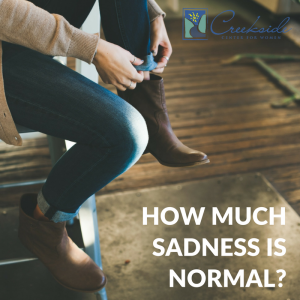 Depression affects 16{c32f220a97554538a750280585b6278238c6d138c527944464fd5f29699b7558} of the population. If you haven’t experienced depression, it’s likely you know someone who has. Depression is a serious medical condition, but it’s still confused with ordinary sadness. Grief is normal after a traumatic experience, such as a loss of a loved one, divorce, job loss, or diagnosis. But if your sleep patterns change and feelings of worthlessness and sadness persist daily for more than two weeks, these are clues that you may be experiencing depression.
Depression affects 16{c32f220a97554538a750280585b6278238c6d138c527944464fd5f29699b7558} of the population. If you haven’t experienced depression, it’s likely you know someone who has. Depression is a serious medical condition, but it’s still confused with ordinary sadness. Grief is normal after a traumatic experience, such as a loss of a loved one, divorce, job loss, or diagnosis. But if your sleep patterns change and feelings of worthlessness and sadness persist daily for more than two weeks, these are clues that you may be experiencing depression.
Artist or athlete, extroverted or introverted, anyone from any personality and ethnic background can develop depression. Women experience depression more than men, but women may be more likely to ask for help. The first onset of depression often happens when a person is in their late teens or 20s, but can develop at any age.
The U.S. culture esteems mental toughness and is quick to label those who feel sad as lazy or weak. But people who have clinical depression don’t lack resilience or will power. They can’t make depression go away on their own. Depression is a medical illness related to changes in the brain. When researchers look at brain scans of people who are suffering from depression, they observe that critical brain chemicals are out of balance. Like other illnesses, depression can improve with the right treatment.
Possible Treatments for Depression:
Medication: Going to a health professional doesn’t mean you’ll leave with a prescription. Medication is only one of the tools used to lift depression. If your doctor does prescribe antidepressants, it likely won’t be for life. Your doctor will help you determine the right time to stop your medication.
Talking to a mental health professional: People used to think that dwelling on problems only made them worse. That myth has been refuted by many studies. Talking to a professional can significantly improve depression by addressing negative thought patterns, suggesting new coping strategies, and identifying relationship troubles.
Exercise: Research shows that regular, moderately intense exercise can work as well as some medicines for people with mild to moderate depression. When you exercise with a good friend, you may experience a mood boost from the emotional and social support.
In the midst of depression, hopelessness can be overwhelming. With treatment, sleep and appetite can improve in a few weeks. Positive thinking replaces negative, self-berating ones. After talk therapy, people are better equipped with coping skills to deal with relational and work challenges. Don’t give up. You and your doctor may have to experiment to find the right treatment, the right medicine, or even the right combination of therapies. But depression doesn’t need to define your life.






















